Hands sometimes speak louder than words. We touch a newborn’s tiny toes. We wipe away tears. We soothe someone’s sore muscles. We caress a head. We cook a meal. We pick flowers. For many of us, the instruments at the ends of our arms are key to our work and passion. Surgeons, dentists, pianists, gardeners, chefs, masseuses, writers—all depend on their hands to create and perform.
Because they’re so vital to our everyday passage through life, hands get a lot of wear and tear and tend to age faster than other parts of our body. We get age spots and crepey skin (thanks sun!) and bones and veins in our hands become more prominent as we age. That’s because as we get older, fat deposits in our hands decrease—one of the few times that decreasing fat deposits is an unwelcome development.
Dermatologists offer all kinds of creams, injections, and treatments to help your hands look younger. You can even go to the trouble of surgery to remove veins. But we’re not here to tell you that your hands need help or to make you want to run for a pair of gloves to hide them. Today, we’re celebrating hands and where they’ve taken us in life.
Hands that have loved and worked and played for decades have a certain beauty, as the women featured here demonstrate. We tried out a lot of silly puns to end this text (“let’s give a hand for hands,” “we’ve got to hand it to hands”) but we’ll just let these gorgeous photos by Holly Wilmeth and the words of these accomplished women, all of whom live in San Miguel de Allende, Mexico, take if from here.
Alicia Wilson Rivero, Baker, Age 49
puravidakitchen.com
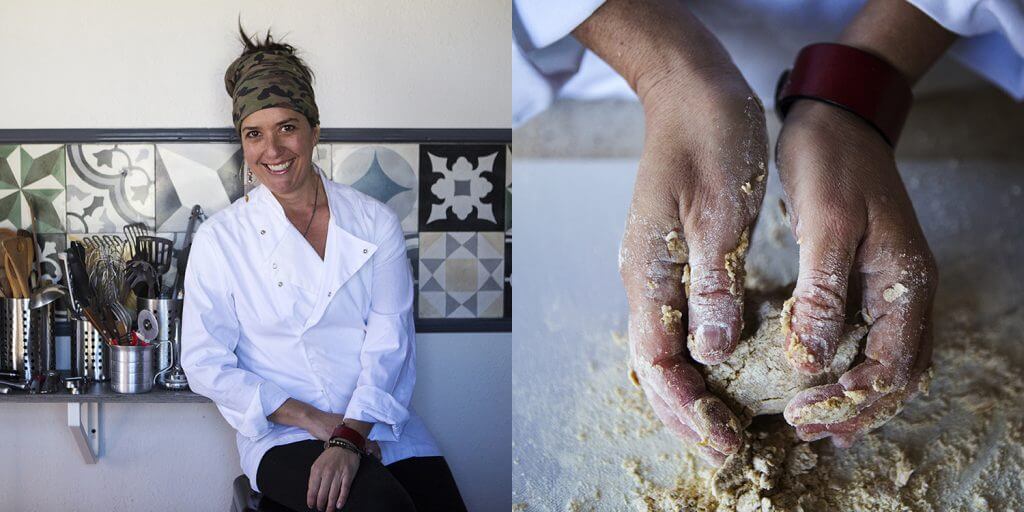
How long have you been baking? My whole life! Truly! My mother started baking classes when I was a toddler. I started working with chefs in Manhattan at the age of 14, and one in particular decided I had a baker’s touch and immersed me in flour, eggs, and sugar, showing me recipes that I do to this day.
My hands are an added set of eyes and ears.
How would you describe your hands? My hands are hyper-flexible. I used to think of it as a great detriment because carrying heavy kitchen items was hard and I’d experience exhaustion in my hands. Over time, however, I’ve gained respect for my hands and their curious abilities. Softness and sensitivity being two qualities that I now see as assets, especially in making pie crust. I never measure, I never weigh the recipe. For the past 30 years, I’ve retained the recipe in my hands—the feel of the cold, cut butter the balance and distribution of it in the flour lets me choose if I’m going to make a firm or flakey crust.
How important is the health and mobility of your hands for your work? My hands are critical to my work. They are an added set of eyes, ears, touch, sound, and taste in choosing and combining ingredients. They decide for me as they can feel for heat, texture, crunch, doneness, and balance in ingredients.
Read More: What Physical Scars Say About the People We Are
Kristina Rogers, Licensed Acupuncturist, Age 65
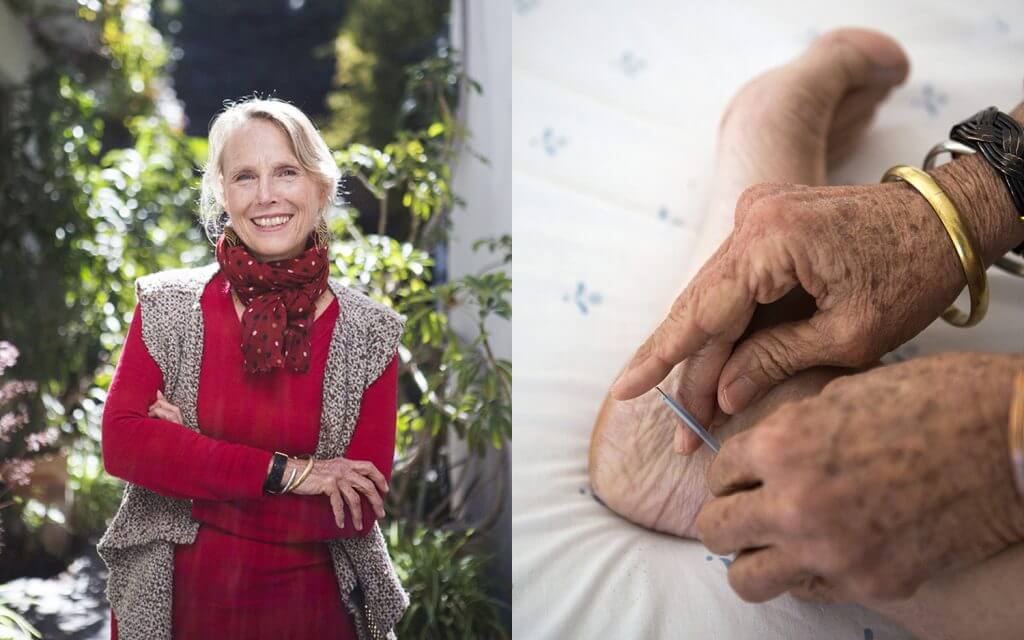
How long have you been an acupuncturist? I’ve been working as an acupuncturist for 34 years. I studied in San Francisco at ACTCM, the American College of Traditional Chinese Medicine. I was in the first graduating class, and many of the classes were taught in our teachers’ homes and clinics.
My hands hold the wisdom of all these years.
I now do a lot of energy healing in addition to acupuncture. I can run my fingers along a person’s limbs and feel where the blockage of energy is.
How do you describe your hands? My hands are strong, sensitive, alive, and sturdy.
How important is the health and mobility of your hands in your work? I need to be able to feel pulses and the sensation of energy or qi under the skin. I like to run my fingers along the skin and find the energy breaks. It’s like there’s this loss of vitality that my hands can find and identify.
How do you care for your hands? I do yoga and often stretch my hands. I live where it is quite dry, so I put a thick cream on them, and I also visit my body worker when I feel I need more help. I’ve never kept polish on my nails. My hands are workers, and I want them unadorned in some way. I’ve always felt they speak to my sensitivity. They are long and aged, yet wise. They hold the wisdom of all these years.
Nisha Ferguson, Painter, Age 54
danishasculpture.com
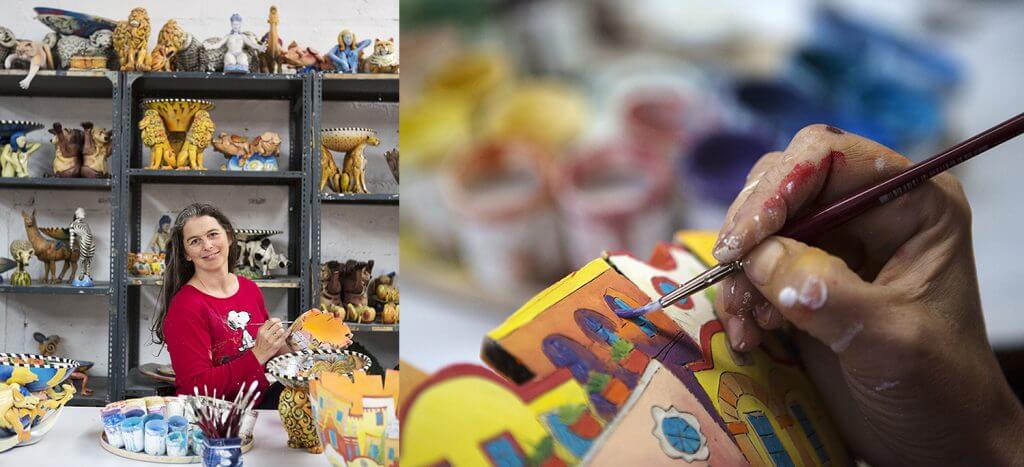
How long have you been painting? I have been drawing and painting ever since I was a little girl; however, I’ve been painting for a living since 1991. Both my mother and grandmother were artists.
It is very important for my work to have my hands healthy.
What type of painting do you do? My work is colorful, stylized, and decorative. I paint on ceramic so I always feel like I am creating artifacts that will be around for thousands of years, especially my cityscapes, which will show what life was like in our times if anyone ever digs them up.
How do you describe your hands? My hands are strong, useful, and usually a mess. They look just like my grandmother’s hands.
How important are the health and mobility of your hands to your work? I never think of the health of my hands because I realize I take them for granted. It is very important for my work to have my hands healthy. However, any time I bash them or injure them—which I have done—I just keep going.
How do you care for your hands? I never think twice about caring for them. I do nothing except cut my fingernails. I actually think my hands care for me.
Alison Dale Bastien, Herbalist and Midwife, Age 60
lavictoriana.com
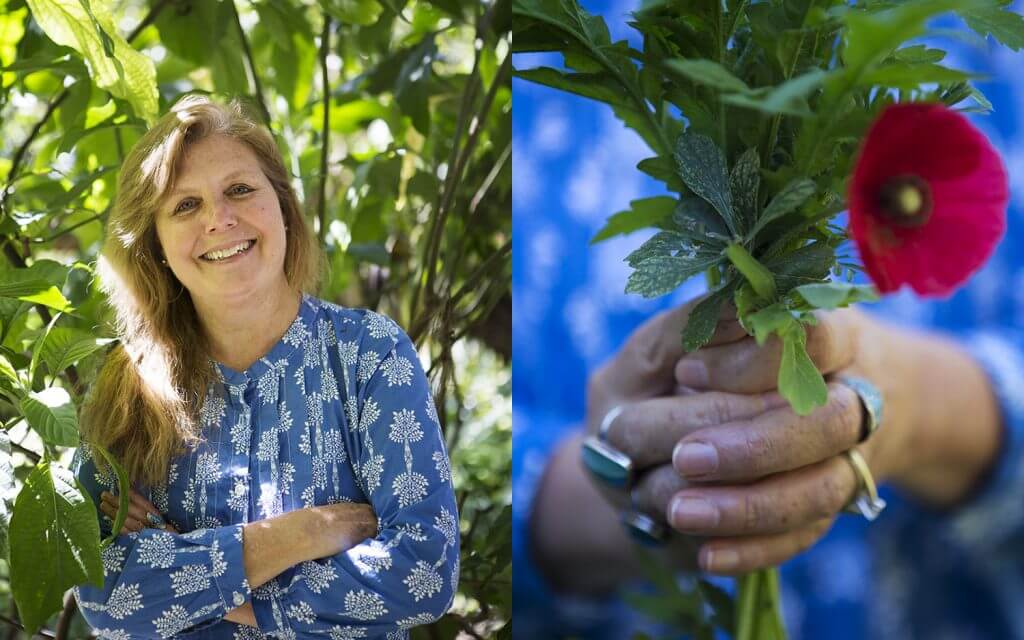
What intrigues you about hands? I love my hands. I love hands in general…a baby’s tiny hands like little jellyfish, opening and closing; old people’s hands, their freckled surfaces like overripe bananas and the ropey rivers of veins.
My hands allow me to meet the baby before it is born.
My hands see the unseen first. As a midwife, my hands allow me to meet the baby before it is born, as I palpate the mother’s belly. Sometimes, they were the first to touch the newly born. My hands listen and learn as they touch a plant. My hands in the soil converse with the earth. My hands making quilts, collage, or drawings take the questionable pieces and create something whole.
My hands take the notes, write the odes, sketch the flowers, make the tea, light the candles, check the messages, mix up the potions, listen through the fingers to the pulses and beats and sighs of the mothers and babies. My hands give and exchange, hold and caress, open and close. They make music. They hail the directions, they press together in prayer. I used to be an interpreter for the deaf. My hands were my voice. They spoke for others. My eyes heard hands.
How important are your hands for your work? My hands are my angels and my guides—they are like the flowers guarding the gate at the portal between worlds; they mediate what is in my heart and mind, and permit me to meet the heart and soul of plants and people and dreams that wish to be born.
My hands allow me to become part of creation, in all that this means.
Sue Ellen Jacobs, Weaver
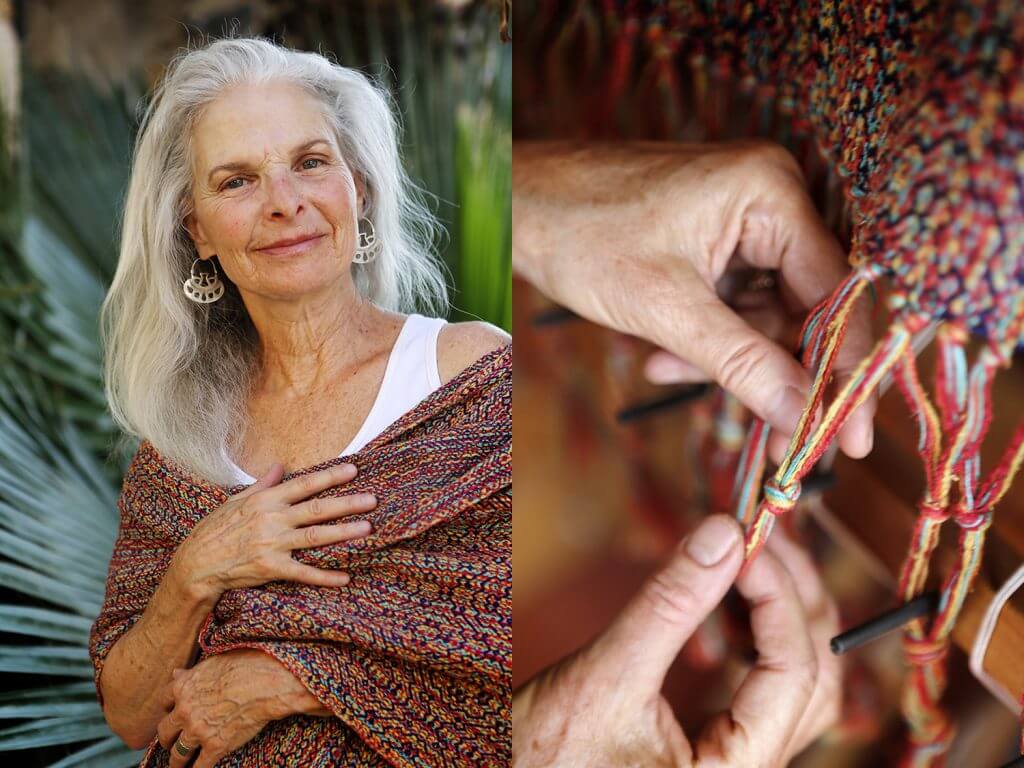
How long have you been weaving? 25 years
How do you describe your work? What’s your specialty? My work is my expression of who I am and my connection to higher energies. I would say that the process of designing and weaving is a spiritual and meditative experience for me; it connects me to myself as well as to hundreds if not thousands of years of weaving tradition and the women who wove before me. I believe we are a special group as weaving is not everyone’s “cup of tea.”
My work is all about the hands and their ability to manipulate hundreds of threads throughout a very intense process.
My specialty is handwoven art wear. I weave primarily shawls (rebozos). Each piece is one of a kind, and many of my pieces are commissioned by women who resonate with my work. In my experience, most women prefer to come to my studio and be involved with the selection of fibers and enjoy having something custom made just for them. I do not repeat the designs, each one is unique.
How do you describe your hands? I would say they are small, delicate, yet strong and they allow the flow of energy to express who I really am in my finished work.
My husband’s description is well-defined, thin fingers, with the expressiveness of a cluster of a small tree branches. He is a painter and says they bring to mind the hands of a Van Dyke or a Kokoshka painting.
How important are the health and mobility of your hands for your work? Very important. I weave fabrics that contain complicated patterns on a complicated loom, and one mistake will show in the finished piece. So my work is all about the hands and their ability to manipulate hundreds of threads throughout a very intense process. Mental focus and attention to detail are also critical, as well as great eyesight. I often use magnifier glasses in some parts of the process.
How do you care for your hands? Organic coconut oil for moisture. One teaspoon of turmeric mixed with ground black pepper per day as an anti-inflammatory.
Emerson Pirot, Guitarist, Age 69
emersonpirot.com
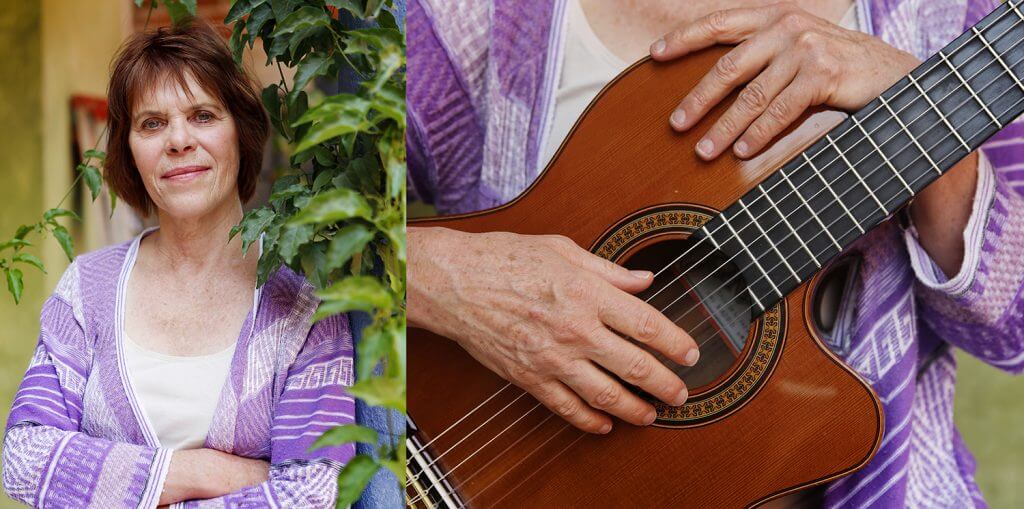
How long have you been playing guitar? I played the guitar as a teenager, self-taught, mostly folk songs. After 10 years, I put down the guitar and played the flute very seriously for five years. Then I switched to piano (my first instrument), which I played professionally for 20 years; I also received a Bachelor of Music in jazz piano. I started playing the guitar again, after a 30-year hiatus, eight years ago, at age 57.
I file down the callouses on the fingertip of my left hand.
Do you have a certain type of music you especially like? I specialize in Brazilian popular music. I sing in Portuguese and play samba and bossa nova. I also love the folkloric music of Brazil’s northeastern region.
How do you describe your hands? They’re small, which makes it more challenging as a guitarist or pianist to make the stretches. But it also makes them nimble and they fit into tight places.
How important is the health and mobility of your hands for your work? It is everything.
How do you care for your hands? I warm them up carefully each time I play. This includes gentle stretching, starting with the fingers, wrists, elbows, shoulders, and on to the rest of the body. I file down the callouses on the fingertip of my left hand. I keep the left hand fingernails closely trimmed and the right hand fingernails filed to the appropriate shape for plucking the nylon strings of the guitar
Mariela Fernandez, Flower Arranger, Age 48
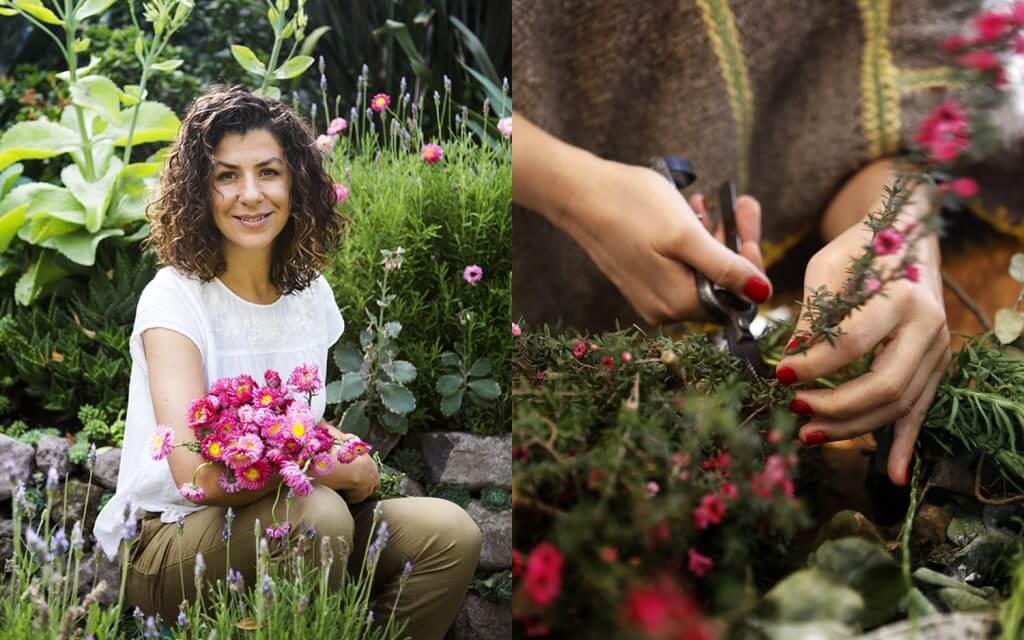
How long have you been a flower arranger? I used to work in an interior design store as the manager, until three years ago when a friend suggested I join her in the flower industry. I wasn’t sure at the beginning, but at the moment I decided to participate, my life changed completely.
My creativity is completely connected to my hands.
Do you have a particular specialty or certain kinds of flowers you like to work with? I started to take workshops given by women from all around the world that helped me create my own style. I started to realize that I didn’t have to bring flowers from other parts of the world. Local flowers offer many options to work with, so I decided to explore Mexican flowers.
Flower bouquet delivery, social events, and restaurant arrangements are an important part of my job. For restaurant arrangements, I need to think of creating an ambience in a specific space with plants and flowers. This type of work has led me into garden architecture, which is a whole new world I’m starting to explore.
How do you care for your hands? I don’t have a specific routine for my hands; I just try to be careful at the moment of cutting flowers and removing thorns. Although I’ve injured my hands because of carelessness and it’s been really annoying, I’m still able to work.
How important are the health and mobility of your hands to your work? My creativity is completely connected to my hands. Every day I have new ideas and different concepts I want to achieve. I feel like every time I start my flower routine, from the moment I buy them in the market to the moment I deliver the arrangement, I’m evolving and improving my skills so everyday gets better.
Photos by Holly Wilmeth
Read More: The Maintenance Divide: The Unattractive Clash Over How Much Help We Get With Our Looks

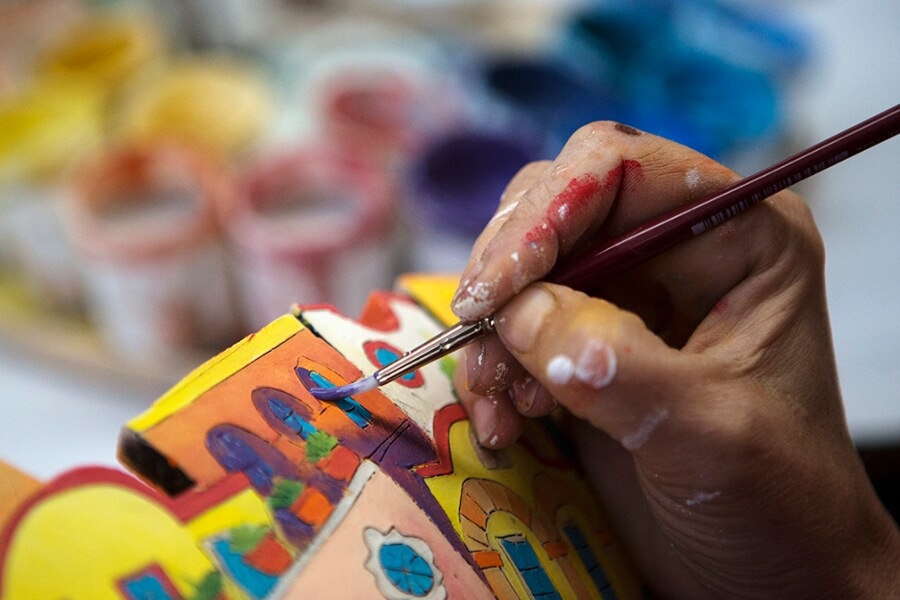



















0 Comments